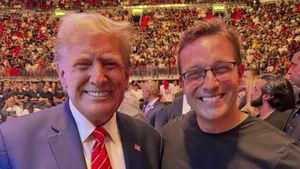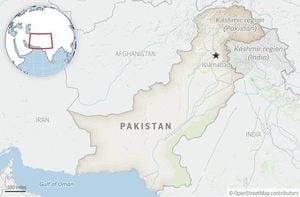India is once again set to make its mark on the global stage as it sends not one, but two multi-party parliamentary delegations to the 80th United Nations General Assembly (UNGA) in New York. This move, which revives a longstanding tradition that was interrupted in 2004, signals a renewed commitment to international engagement and the representation of India’s democratic diversity in the world’s premier diplomatic forum.
According to reporting by The Economic Times and Daily Excelsior, the delegations are notable not only for their bipartisan makeup but also for their "non-official" status. Rather than strictly representing the Indian state, these groups are seen as ambassadors of Indian democracy itself, embodying a united stance on a host of pressing global issues. As one Member of Parliament put it, these delegations are “more of representatives of the Indian democracy and its united stand on a host of issues.”
This year, the initiative is led by two prominent BJP Members of Parliament: P P Chaudhary and Daggubati Purandeswari. Each heads a delegation comprising MPs from across the political spectrum, including the Congress, Samajwadi Party, RSP, RJD, DMK, TMC(M), and AAP, among others. The first group, under Chaudhary’s leadership, will be in New York from October 8 to October 14, while the second, led by Purandeswari, will arrive starting October 27.
The delegation led by P P Chaudhary includes a total of 15 MPs, reflecting a broad cross-section of Indian political life. Among them are Anil Baluni, Nishikant Dubey, and Ujjwal Nikam of the BJP; Vivek Tankha and Kumari Selja of the Congress; Rajeev Rai of the Samajwadi Party; and N K Premachandran of the Revolutionary Socialist Party. The second group features V D Sharma, Dilip Saikia, and Rekha Sharma from the BJP; Manoj Kumar Jha of the RJD; P Wilson of the DMK; G K Vasan of the TMC(M); and Sandeep Kumar Pathak of the AAP, among others.
For many observers, the return of these parliamentary delegations to the UNGA is a welcome sign of India’s intent to participate actively in international discourse. As one MP explained, “India has a longstanding tradition of sending parliamentary delegations to the UNGA, allowing MPs to be part of international discourse and contribute,” though this tradition was “interrupted” in 2004. The resumption of this practice in 2025 is seen as a reaffirmation of India’s commitment to global dialogue and cooperation.
The UNGA itself is no ordinary gathering. Described by Purandeswari as “a vital platform where member nations come together to discuss key global issues, from peace and security to human rights, development, and international cooperation,” the assembly sets the tone for international relations each year. “I look forward to representing our nation and contributing to these important deliberations on the world stage,” Purandeswari stated, underlining the significance of India’s presence.
Beyond the symbolic value, the delegations are also composed of individuals with significant expertise and experience. For example, Ujjwal Nikam, a BJP MP included in Chaudhary’s team, is well known for his role as the special public prosecutor in the Mumbai terror attack case involving Ajmal Kasab—the lone Pakistani terrorist captured alive, convicted, and ultimately hanged. Nikam’s inclusion highlights the seriousness with which India approaches issues of international security and justice.
P P Chaudhary’s own credentials add further weight to the delegation. He currently heads the joint parliamentary committee scrutinizing the constitutional amendment bill for simultaneous elections, a topic that has generated considerable debate within India. This dual role—both as a domestic reformer and an international representative—underscores the interconnectedness of India’s internal and external priorities.
The bipartisan composition of the delegations is particularly noteworthy in today’s political climate, where polarization often dominates headlines. By including MPs from a wide array of parties—ranging from the BJP and Congress to regional outfits like the DMK and TMC(M)—India is sending a clear message of unity and democratic pluralism to the world. This approach not only strengthens India’s voice at the UNGA but also demonstrates a willingness to engage in constructive dialogue across ideological divides.
Historically, India’s practice of sending parliamentary delegations to the UNGA has served several important functions. It allows legislators to gain firsthand experience of international diplomacy, fosters cross-party understanding on foreign policy, and helps ensure that India’s positions are informed by a broad range of perspectives. The interruption of this tradition in 2004 was seen by some as a missed opportunity for parliamentary engagement on the world stage, making its revival in 2025 all the more significant.
The timing of the delegations’ visits is also carefully coordinated. The first group, led by Chaudhary, will participate in the UNGA’s early sessions, while the second, under Purandeswari, will engage in subsequent meetings. This staggered approach ensures that India maintains a continuous and active presence throughout the assembly’s proceedings, maximizing its influence and visibility.
For the MPs involved, the opportunity to represent India at the UNGA is both an honor and a responsibility. As Purandeswari emphasized, the assembly offers a unique forum to contribute to discussions on issues that affect not only India but the entire global community. From peace and security to development and human rights, the topics on the agenda are as urgent as they are complex.
Observers note that the participation of such diverse delegations could have a positive impact on India’s diplomatic relationships. By presenting a united front and engaging constructively with other nations, India is well positioned to advance its interests and values on the international stage. Moreover, the experience gained by MPs in these forums can help inform domestic debates on foreign policy and global affairs.
Of course, the challenges facing the UNGA in 2025 are formidable. With ongoing conflicts, economic uncertainty, and a host of transnational issues demanding attention, the need for effective international cooperation has rarely been greater. India’s decision to send multi-party delegations reflects a recognition of these challenges and a commitment to playing a proactive role in addressing them.
As the world watches the proceedings in New York, the presence of Indian parliamentarians from across the political spectrum serves as a reminder of the country’s democratic vibrancy and its willingness to engage with the international community. It’s a story of tradition renewed, diversity celebrated, and a nation ready to make its voice heard where it matters most.
In the coming weeks, all eyes will be on the Indian delegations as they participate in the 80th UNGA—an opportunity not just to represent their country, but to help shape the global conversation for years to come.



